In the first article about learning Chinese through wuxia, Sara K. explained what wuxia is, why it’s relevant for Chinese learners and how to get started with wuxia. This second article is focused entirely on the “how to get started” bit and introduces a few wuxia novels. Hopefully, this guide will help you chose your first wuxia novel, or, if you’re already familiar with the genre, it might give you suggestions for what to read next!
One of the hardest things about getting into Chinese fiction for Chinese learners is that they simply do not know what to read. This is especially big problem for Chinese learners who want to try wuxia, since most of them know little about the genre.
In the last article, I explained what wuxia is and why Chinese learners should know about it. Here, I present five novels that I consider to be good starting points for Chinese learners who want to try wuxia.
A special problem with wuxia is that many novels have slow beginnings – which can be a particularly big problem for people who are struggling with the language. A classic example of a novel with a slow beginning is The Heaven Sword and Dragon Sabre (倚天屠龍記). The main protagonist, Zhang Wuji, is not even mentioned in the first 250 pages, and in my opinion the story is really slow until almost halfway through the novel.
That said, the last section of the novel is a heck of a roller-coaster, and the scene where a certain character sticks a sword into someone’s chest is definitely one of the five most famous moments in all of wuxia fiction, but I would advise even advanced learners to stay away from it until they’ve read at least a few other wuxia novels. That’s why this list is biased towards novels that I think start at a relatively quick pace.
In this article, I will introduce the following novels:
- Precious Sword, Golden Hairpin (寶劍金釵) by Wang Dulu (1939)
- Meteor, Butterfly, Sword (流星‧蝴蝶‧劍) by Gu Long (1973)
- Return of the Stormy Swallow (風雨燕歸來) by Wolong Sheng (1961)
- Demi-Gods and Semi-Devils (天龍八部) by Jin Yong (1963)
- Kung-fu (功夫) by Giddens Ko (2004)
- Other novels and further reading
—
Precious Sword, Golden Hairpin (寶劍金釵) by Wang Dulu (1939)
Language difficulty: (abridged version) intermediate, (unabridged) upper-intermediate/advanced
When some martial artists come to murder Yu Shulien’s father, she swiftly and single-handedly kills them all.
Meanwhile, Li Mubai, who possesses the ‘precious sword’ in the title, has decided that, if he can’t marry an excellent martial artist, he will never marry. One of his friends tells him about Yu Shulien, and says that she will marry anyone who can beat her in a duel. Li Mubai doesn’t believe this, but he goes to duel her anyway. He finds that she is a fine swordswoman, and promptly falls in love with her.
Then he finds out that his friend made up the marry-whoever-beats-her-in-a-duel bit. In fact, she is already engaged to marry Meng Sizhao, and he gave her a nice golden hairpin. This is a great disappointment to Li Mubai.
Then the enemies of Yu Shulien’s family try again…
Thus begins a tale of love and revenge.
Background
Wang Dulu was one of the most popular wuxia writers of the 1930s. He strongly influenced all wuxia writers who followed him.
His most famous work is the ‘Crane-Iron Pentalogy’, of which Precious Sword, Golden Hairpin is the second novel. Readers do not need to know anything about the first novel, Crane Frightens Kunlun (鶴驚崑崙), to enjoy Precious Sword, Golden Hairpin, and I think Precious Sword, Golden Hairpin is better. The other three novels are Sword Force, Pearl Shine (劍氣珠光), Crouching Tiger, Hidden Dragon (臥虎藏龍), and Iron Rider, Silver Vase (鐵騎銀瓶).
You can read more about the pentalogy here.
Why This Novel Got on the List
First of all, this is such an influential novel that being familiar with it helps one appreciate later wuxia novels, just as reading Asimov and Heinlein helps one appreciate later science fiction novels.
Second, this was originally published in a newspaper, and Wang Dulu wrote it so that new readers could jump into the story without reading the first few chapters. How does he do this? About once ever chapter or two, there is a brief recap, which usually goes like this:
Character A: What is going on?
Character B: It all started when… [recap]
This is excellent for Chinese learners. If there is something the reader didn’t quite understand, and it’s important, it will get mentioned in a recap.
Additionally, each chapter title is a summary of what happens in that chapter. Though the chapter titles are written in classical Chinese, they still let readers preview what they are going to read about in that chapter.
Also, for an wuxia novel, the language is relatively easy. There is some archaic vocabulary, but 95% of the archaic words can be ignored. The sentence structure is simpler than many other wuxia novels.
Furthermore, the beginning of this novel moves quicker than most wuxia novel beginnings – Yu Shulien kills off her father’s assailants before page 20.
And finally, this novel made it to the list because it’s one of my favorites.
Recommended Approach
In traditional Chinese characters, there is an abridged version of this novel combined with Crouching Tiger, Hidden Dragon (I presume Sword Force, Pearl Shine is included too) called 臥虎藏龍-重出江湖版. I have read the first chapter of the abridged edition, and language-wise, it is easier than the original (and the original itself is not that hard). It’s also a lot shorter. I think the abridged version is an excellent choice for intermediate Chinese learners.
However, advanced Chinese learners should just go straight to the unabridged novel (available in both simplified and traditional characters).
The most famous adaptation of the Iron-Crane pentalogy is of course is Ang Lee’s Crouching Tiger, Hidden Dragon (that, by the way, is another reason this novel made it to the list). While it’s a good movie, and it introduces the main characters of Precious Sword, Golden Hairpin who live long enough to be in Crouching Tiger, Hidden Dragon, I don’t think it’s the best place to start. It’s not particularly easy language-wise, there are major spoilers for the preceding novels, and I think Precious Sword, Golden Hairpin is simply a better story. That said, beginning Chinese students who want to get a feel for wuxia and don’t mind using foreign language subtitles might want to watch the movie.
There is also a manhua adaptation by Andy Seto. Though the manhua is called Crouching Tiger, Hidden Dragon, the first couple volumes are actually based on Precious Sword, Golden Hairpin (note: I haven’t read the manhua, so this is second-hand information). The manhua is available in English, French, and of course Chinese.
—
Meteor, Butterfly, Sword (流星‧蝴蝶‧劍) by Gu Long (1973)
Language Difficulty: Intermediate
This has possibly the most famous opening of any wuxia novel (I’m borrowing this English translation from Wikipedia):
“A shooting star burns but briefly, but while it burns what other star in the heavens is as bright, as brilliant. When a shooting star appears, not even the stars in the enduring constellations can match its light. The life of a butterfly is delicate, even more fragile than flowers, but alas it lives only in the spring. It is beauty, it is freedom, it is flight. Although its life is short, it is fragrant. Only swords, in comparison, are eternal. A swordsman holds his light, his brilliance, and light in his hands, but should the sword feel emotion will its brilliance be as short as that of a meteor.”
An alternative translation of the opening is available here.
I think this is one of the harder passages in the novel, so if you can read the above in the original Chinese, you are ready to read this novel.
Meng Xinghun is a sentimental and very sensitive guy, who wants to be sweet, gentle, and most of all, do the right thing. Alas, he is forced to work as an assassin. The fact that his profession is so at odds with his personality makes him profoundly unhappy. He tries to drown his sorrows with various addictions (for example, he’s alcoholic), but this doesn’t work, so he tries to drown himself in a more literal way. However, his suicide attempt is thwarted by the woman who pulls him out of the river and, immediately after saving his life, runs off. Might this woman represent a ray of hope in Meng Xinghun’s gloomy existence?
Background
Gu Long is the most famous of all Taiwanese wuxia writers, and is generally ranked as the second most popular wuxia writer of the 20th century. He studied foreign literature at Tamkang University, and combined traditional wuxia (he was a fan of Wang Dulu) with the influences of foreign writers such as Jack London, Ian Fleming, Nietzsche, Ernest Hemingway, etc. to form his own style.
Lots of TV shows and movies have been adapted from his works, as well as some manhua, and more than 20 years after his death, there are still new adaptations coming out.
This specific novel is being adapted into a MMORPG, called ‘Butterfly Sword Online’, not to mention many TV/movie adaptations.
Why This Novel Got on the List
Gu Long simply must be represented on a list like this, because he is one of the most popular writers, and because he is the easiest to read. Lots of short paragraphs and short sentences. Some of his novels are mostly dialogue. His works can be read at a lower level of Chinese than pretty much any other wuxia writer.
That said, Gu Long novels are written for educated native speakers, so encounters with Cthuthlu can happen, especially in his earlier works which tend to have more complex language. However, I think novels from the middle of Gu Long’s career are generally fine for intermediate learners and above.
The biggest problem that Chinese learners have with Gu Long, however, is not with the language, but with the content – many people simply don’t like his novels.
If you do like his novels – congratulations, you now have a lot of relatively easy material that you’re motivated to read. If you don’t like his novels, it’s better to try to read a more difficult novel that you actually do like than to try to force your way through something you don’t like.
So why this Gu Long novel? It is one of his most famous novels, and it seems to work with a wide range of readers. Furthermore, it’s shorter than most of his other famous novels, and is not a part of long series.
Some people love this novel, some people hate it, but I think few people would say it’s boring.
Recommended Approach
This novel so easy to read that I would actually expect the TV/movie adaptations to be harder to understand than the novel itself (unless one’s listening skills are way ahead of one’s reading skills). Therefore, my advice is to go straight to the novel. You might not like it, but even if you don’t, you’ll learn something.
—
Return of the Stormy Swallow (風雨燕歸來) by Wolong Sheng (1961)
Language difficulty: Upper-intermediate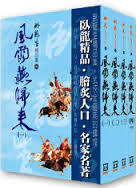
Story
Tao Yu is back, he’s a huge threat to everyone in the martial arts world, and he’s getting stronger every day. Can the protagonists defeat him before it’s too late?
Background
This is the sequel to the much more famous Swallow and Dragon (飛燕驚龍), which was one of the most popular novels of the 1950s. Wolong Sheng, along with Gu Long, is considered one of the four great wuxia writers of Taiwan. Wolong Sheng had much less formal education than most major wuxia writers, yet he was an avid reader of wuxia (another Wang Dulu fan!)
In his heyday, his novels were so popular that some people would try to look over his shoulder as he wrote the next instalment for the newspaper because they needed to know what happened next that badly. Indeed, the fact that so many people in Taiwan had to read the latest instalment before they ate breakfast was known as ‘Wolong Sheng’ or ‘Yuchai Meng’ syndrome (Yuchai Meng/玉釵盟 is one of his most famous novels).
Why This Novel Got on the List
Since Wolong Sheng is one of the major writers, I think it’s good to represent him here. And out of all of the Wolong Sheng novels I’ve read, Return of the Stormy Swallow is the easiest. That’s partially because it has such a straightforward story – my blurb is so short because I don’t feel I need to say more. It’s also relatively easy from a language perspective – the sentences and paragraphs in this novel are shorter than in most other Wolong Sheng novels. Furthermore, the story moves pretty quickly.
Now, some people might wonder why I chose the sequel instead of the first novel, Swallow and Dragon. I admit that this novel did not make it to the first draft of this list precisely because it’s a sequel. Yet the sequel happens to be easier, and personally, I like the sequel more than the first novel. You don’t have to read Swallow and Dragon first because everything you need to know is covered in Return of the Stormy Swallow. That said, Return of the Stormy Swallow has tons of spoilers for Swallow and Dragon.
I do not think anybody will suggest that Return of the Stormy Swallow is a great literary achievement. That said, I do think it is entertaining, and well suited for building Chinese reading skills. If you need a novel with relatively simple grammar/language/plot, but cannot stand Gu Long, this is a good alternative.
Recommended Approach
Since I am not aware of any adaptations of this novel, I guess you just have to read it. That said, it might be helpful to read a summary of Swallow and Dragon first (here is an overview in Chinese).
—
Demi-Gods and Semi-Devils (天龍八部) by Jin Yong (1963)
Language Difficulty: Advanced
I think, of all of the music written for this story, this song best conveys the atmosphere (note: the song is in Cantonese).
Duan Yu, is the prince of a small kingdom called Dali (present day Yunnan Province). He runs away from home because he is a Buddhist pacifist, and his father wants to teach him martial arts. After running away, he gets into a lot of trouble.
Qiao Feng is the leader of the Beggars’ Sect, the largest organization of martial artists. After certain information about his past emerges, he gets into a lot of trouble.
Xu Zhu is a monk at Shaolin Temple. He observes a demonic game of go (圍棋) in which the player who is losing the game would get plunged into their own personal nightmare and eventually choose to commit suicide in other to stop the horror. Being a monk, Xu Zhu cannot just stand there and let someone kill himself, so he randomly puts down a piece to break the spell. Ah, but by randomly placing a piece in a demonic game of go has consequences…
Imagine that Oedipus Rex and the Odyssey were combined into a single story, but it was set in Song dynasty China, and written as a serial novel with lots of cliffhangers to make readers buy the next issue. That should give you a sense of what Demi-Gods and Semi-Devils is like.
I’ve met a few people who say that this is their favorite wuxia novel. Furthermore, it has been adapted into movies, multiple TV series, a manhua, and one of the most popular Chinese MMORPGs ever. In English, the MMORPG is called ‘Dragon Oath’ and was listed as one of the highest-revenue online games worldwide by Forbes.
Jin Yong is the most popular Chinese novelist of the 20th century. People love to analyze and interpret his works so much that it has become an entire branch of study, known as ‘Jinology’ (金學). I’ve found two ‘Jinology’ books dedicated just to this single novel: 天龍八部欣賞舉隅 and 無人不冤,有情皆孽:細說天龍八部
His key works are considered mandatory reading for all educated Chinese speakers (though I know in practice some just watch the TV series). And as his longest novel, Demi-Gods and Semi-Devils is definitely one of his key works.
In other words, this one novel is probably more popular than all of the other novels on this list combined.
Why this Novel Got on the List.
Since Jin Yong is practically the god of wuxia, I had to put one of his novels on this list. The two big problems with picking a Jin Yong novel for Chinese learners is a) they tend to have very slow beginnings (like The Heaven Sword and Dragon Sabre) and b) the language is difficult. However, Demi-Gods and Semi-Devils has a fast-paced beginning for a Jin Yong novel, and in spite of being his longest, it’s possibly the easiest to read (by contrast The Fox Volant of Snow Mountain, his shortest novel, is one of the hardest).
For one thing, this novel is repetitive – in a good way. You know the really famous ‘No, I Am Your Father’ moment in Star Wars? That happens about four times in this novel. Repetition is good for language learning (and it makes it easier to follow the story if the same things happen over and over again).
Jin Yong uses a lot of chengyu, which is wonderful, because they get repeated often enough that I actually learn them. Reading Jin Yong has probably done more to drill chengyu into my head than anything else.
It is longer than War and Peace, but also a lot more pulpy. This novel was originally a newspaper serial. Guess what sells newspapers? Eye-gouging, people committing adultery, women killing their husbands, men killing their fiancees, Buddhist monks breaking their sacred vows, incest, melting an iron mask onto somebody’s face, people committing suicide in front of their children, etc. (I compared this to Oedipus Rex for a reason). The novel is intended to shock and titillate its readers, while stringing them along with suspense.
Some things did shock me … and eventually, it got to the point where all of the stuff which was supposed to shock and tug my heartstrings had me laughing out loud, which proves that I am a bit like Duan Yu’s half-sister Princess A’zi (阿紫).
Is there some serious literary merit? Yes, in a Greek-tragic sense. However, that pit of literary merit is surrounded by lots of juicy, juicy pulp.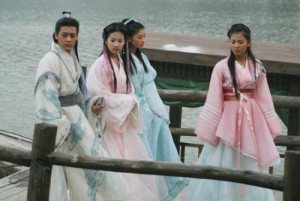
Another reason I picked this novel is that, if I had to pick the one Jin Yong novel which offers the most insight into Chinese-speaking culture, I would pick this one. It’s partially because of the shock/titillation factor (for example, this novel will help you understand traditional Chinese attitudes towards incest), but much of this novel is also about what makes somebody Chinese. Are Chinese people Chinese because their ancestors are Chinese, or are they Chinese because they have embraced Chinese culture? And is deciding who is Chinese and who is not Chinese important at all?
Finally, this is one of the most parodied of all wuxia stories, so reading this will help you understand when people are making fun of wuxia.
Recommended Approach
Even though this is relatively easy by Jin Yong standards, it is still by far the hardest novel in this list. Furthermore, Jin Yong is a brilliant composer of words, and it’s hard to appreciate just how good his prose is if you haven’t read quite a bit of other Chinese-language fiction.
That said, the very first novel I read in Chinese was a Jin Yong (after having read lots of comics in Chinese). While I do not recommend it, it is possible to start with his works, and starting with Jin Yong actually worked out pretty well for me.
If you haven’t read Jin Yong before, I strongly recommend first reading the manhua adaptation of Demi-Gods and Semi-Devils, or watching one of the TV series, to learn some of the story and get some exposure to the language. As far as I know, only the MMORPG is legally available in English.
The second edition and third edition are a bit different, in particular, the ending is different. I myself have only read the second edition, but since most fans say the second edition is better (as in, Taiwanese wuxia fans start fuming when I mention thethird edition), I recommend sticking with the second edition. If you get a copy which was published before 2003, it is second edition (if you somehow end up with the first edition, I’ll be extremely impressed, because I don’t think I’ve ever found a copy of the first edition).
This novel is also available in large-print editions for people whose eyes struggle to with regular-sized print.
Furthermore, this is an incomplete but otherwise excellent resource for people who try to read the novel.
—
Kung-fu (功夫) by Giddens Ko (2004)
Difficulty: Upper-intermediate
The narrator lives in 1980s Changhua, Taiwan. He loves reading wuxia novels. One day, he meets an old man who is martial artist and offers to accept him as a disciple. Might our narrator turn into an wuxia hero himself?
Why This Novel Got on the List
Like Return of the Stormy Swallow, this novel was not on my original list. I had initially disqualified it because it has tons of references to Jin Yong and Gu Long novels, and without familiarity with those stories, it’s not possible to appreciate some of the humor of this novel. That said, I changed my mind about this because some people who know hardly anything of stories of Jin Yong / Gu Long have read and enjoyed this novel. While I still think it’s better to read this after reading some Jin Yong and Gu Long novels (or at least watching the adaptations), apparently it’s not necessary to do so.
Besides, you could read this novel, then go read some Jin Yong / Gu Long, and then read this novel again. You’ll be able to read this novel a second time with a fresh perspective, and of course reading the same thing twice is very good for improving your Chinese.
Giddens Ko is the most popular active fiction writer in Taiwan today, and he’s also very popular in China, so I think it’s good for all Chinese-learners to know about him. And, of all of the Giddens novels I’ve read, I like this one the most.
This is much shorter than most famous wuxia novels, and the language is also relatively easy. And the fact that it’s set in the 1980s rather than the 18th century might actually help readers who are new to wuxia.
Finally, unlike the other novels on this list, this novel is available online for free at the writer’s official website.
Recommended approach
I still strongly recommend reading at least one Gu Long novel before reading Kung-fu, since quite frankly, novels such as Meteor, Butterfly, Sword are not harder than this novel, and it will help you appreciate it.
There is a lovely manhua adaptation of Kung-fu, which I recommend to people who do not feel confident enough to take on the novel itself. Actually, a good approach might be the read the manhua first, and then only read the novel itself after reading some Gu Long and Jin Yong novels. There is also a movie adaptation which will be released in the summer of 2015.
I think any one of these novels would individually be a decent introduction to wuxia. However, if one is having trouble picking one, one could just read them all. I think reading all five of these novels would give one a good sense of what wuxia is.
If a Chinese learner does decide to read them all, this would be my recommended order:
- Kung-fu (manhua)
- Precious Sword, Golden Hairpin (abridged or unabridged)
- Meteor, Butterfly Sword
- Return of the Stormy Swallow
- Demi-Gods and Semi-Devils (this is a bit of a stretch, but if you were able to read the above three novels, then I think you should be able to read Demi-Gods and Semi-Devils if you’re willing to invest the effort in the extra scaffolding
- Kung-fu (novel)
Other novels
Here are some novels which did not make it to the list because a) they are too difficult and b) even if one is fluent in Chinese, I do not think these are the best choices for people who’ve never read an wuxia novel before. But I think one should still be aware of these novels to have a better appreciation of just how diverse the genre is and, of course, to stimulate your curiosity:
The Bride With White Hair (白髮魔女傳) by Liang Yusheng (1957)
The White-Haired Demoness is one of the most famous characters in all of wuxia, and certainly the most iconic female character. Even though this novel was written in the 1950s, it continues to be very influential, with the newest film adaptation set to hit theaters in February 2014. I don’t think it’s a good novel because, well, much of the writing is mediocre. But it is a great novel because the White-Haired Demoness herself is such a memorable figure … not to mention the fact that the novel is, even after all these years, a very refreshing departure from ‘standard’ wuxia. This is required reading for all wuxia fans and anyone who’s interested in gender dynamics in Chinese-speaking cultures. If you try to read the novel and get impatient, my advice is to go straight to the last third – all of the good stuff (and the stuff which makes the novel famous) is in the last part.
I have written more about The Bride with White Hair here.
Happy Heroes (歡樂英雄) by Gu Long (1971)
Gu Long thought that wuxia novels might be focusing too much on anger, hatred, revenge, violence, etc. So he wrote a wuxia novel that’s primarily about joy and companionship. And it works. For example, one of the protagonists has discovered the most comfortable bed in the entire world, so his goal in life is to arrange affairs so he can spend as much time lying in bed as possible. This is actually my favorite Gu Long novel. I did not put it on the list because I think it’s too atypical, but I definitely think it’s worth checking out, especially if you get tired of angsty/gory wuxia.
Tang Dynasty Dragon Duo (大唐雙龍傳) by Huang Yi (1996)
This is the most popular wuxia novel (in Taiwan/Hong Kong) of the 1990s. At around seven thousand pages, it is the longest novel I have ever read. And I think it’s worth it.
I have written more about Tang Dynasty Dragon Duo here.
Passionate Wastrel, Infatuated Hero (多情浪子痴情侠/天觀雙俠) by Zheng Feng (2006)
This might be the most popular wuxia novel of the first decade of the 21st century – it is very popular in China and Taiwan. While Zheng Feng’s later novels diverge more from standard wuxia, I’m listing this one because a) it’s the most accessible and b) it’s the most famous. I even considered this novel for the list of first five wuxia novels to read, but I ultimately pulled it from the list because it has too many wuxia in-jokes while being harder to read (language-wise) than Kung-fu. For example, much of the Mongolian sequence in Passionate Wastrel, Infatuated Hero is a parody of a certain famous wuxia novel.
I have written more about Passionate Wastrel, Infatuated Hero here.
The Nine Provinces (九州) by Jiangnan (2005)
Jiangnan is currently one of the most popular, if not the most popular, wuxia writer in China today. I need to put this novel on the expanded list because I have never read anything else like it – even Jiangnan himself says that this novel is a ‘betrayal’ of wuxia because he messes with so many tropes of the genre.
I have written more about The Nine Provinces here.
About Sara K
Sara K. has been studying Mandarin since Fall 2009. She grew up in San Francisco, California, and writes It Came From the Sinosphere for Manga Bookshelf, and has her own personal blog, The Notes Which Do Not Fit. She has previously written two articles on Hacking Chinese: A language learner’s guide to reading comics in Chinese and Approaches to reading in Chinese.
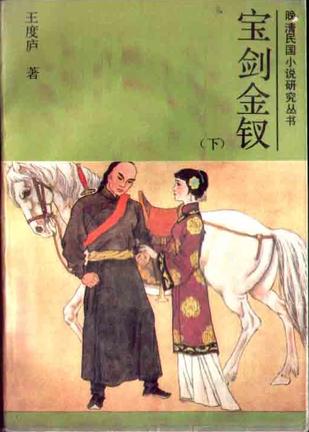

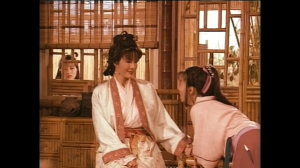
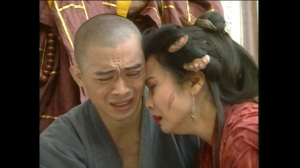
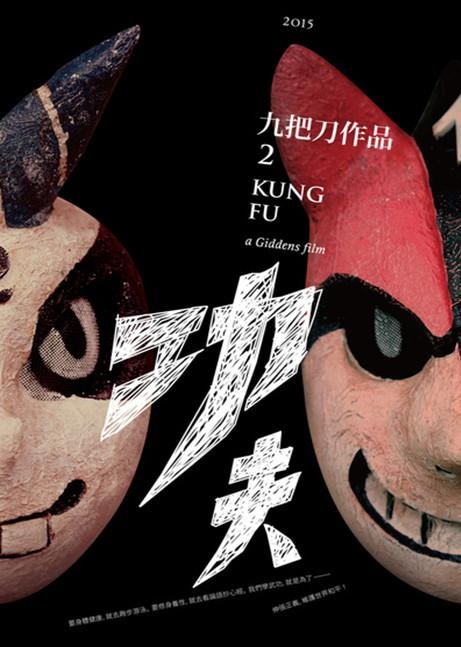

18 comments
Awesome level of detail Sara! After reading your two articles I’m inspired to add some wuxia to my reading list. Thank you!
Thanks, lots of useful pragmatic advice that I can follow up on my next visit to a local Kaohsiung bookstore.
Everyone wants to achieve mainstream second language compentancy, but they often find that then have nothing in common with the native speakers to discuss.
So WuXia may not only be a bridge to better reading; it is just as likely to be an ice-breaker for a lot of interesting conversations and new friends. You only get so far with “Where are you from?” “How long have you been here?” and so on. That is really ‘traveller’s Chinese’.
Yes, it is an excellent ice-breaker. Even if the native speaker has no particular interest in wuxia itself, that fact that you, a foreigner, is familiar with wuxia will intrigue them.
Also, if you live in southern Taiwan, I suggest going up to Tainan, since the bookstores near Tainan train station (particularly the used bookstores) are better than the ones in Kaohsiung IIRC. There’s also a bookstore in Pingdong City that I like. But maybe I just never found the good bookstores in Kaohsiung 😀
If anyone in Kaohsiung city would like to read wuxia novels, I know a great place to go – Kaohsiung Public Library! That’s where I found these wuxia stories when I was a kid.
http://www.ksml.edu.tw/ksml/englishweb/history.htm
Searching for the book you want here:
http://webpac.ksml.edu.tw/webpacIndex.jsp?webpacLang=en_US
Just go in any library branch and say you wanna apply for your library card, you get to bring these wuxia novels home and enjoy! With a good cup of coffee, or my favorite drink when I read, Arnold Palmer!!
I have borrowed wuxia novels from the Taoyuan City Library. Their wuxia collection is … well loved, which means books are often missing or exhibiting a high level of wear and tear, and sometimes I would have to wait for the book I wanted to become available. I know that the Banqiao library system has an even more extensive wuxia collection, but I never got around to checking if I was eligible for a Banqiao library card (which I possibly was not, since I did not live in Banqiao).
> this novel is available online for free at the writer’s official website
The article’s link to Giddens Ko’s novel Kung-fu (功夫) is no longer good, but this one works:
http://giddens.idv.tw/story/city-fear/kung-fu
I have a collection (over 150?) of my father’s Chinese WuXia novels for sale. He’s been reading them for years and guessing many are out of print. Any ideas on where to post this?
I am curious what are your recommendations for approaching 金庸’s works as a high intermediate/beginning advanced reader? I have no problem reading most contemporary Chinese fiction (am an avid reader of 刘慈欣 the science fiction author, and have read his entire corpus in the original Mandarin).
However when reading 天龙八部 I find there are passages where I am just hopelessly lost, have not even a clue what’s going on. Especially where certain poetry/spells are being read. Do I need to bite the bullet and learn Classical? Or perhaps even with my current knowledge I need to start with an easier author like 古龙?
Thanks!
I think if you can read most contemporary Chinese fiction, you just need to rely on Google/Baidu when you encounter difficult passages that feels “classical.” It is what I do when I read “The Ravages of Time” (a comic about Three Kingdoms). Most of its dialog is average difficulty, but occasionally it will quote ancient text that are not familiar to me at all, so I’m always reading around the subject matter. If I find the Chinese sources still difficult to understand, I would even try searching for English translation/analysis about the passage. After repeated exposure to the same phrases you’ll find a pattern to “Classical” stuff and be able to skim, unless you want to understand absolutely everything about a specific passage/citation. 🙂
Or do it digitally in Pleco’s document reader or other place where you can easily find definitions quickly without interrupting reading too much.
Thanks for all the replies! Yes I read digitally on my Kindle which has the CEDICT Chinese-English dictionary installed, and have my phone with Pleco with a few odd dictionaries available as well. Making decent progress now..and yes I do just skim over some of the poetry and classical-style sections if it isn’t too central to the plot. Wuxia is fun!
I doubt anyone will even see this. But if you do, I’d like your opinion.
The only Wuxia novel I ever finished was the first one I tried, Jin Yong’s 连城诀. I really enjoyed it.
From there, I tried 射雕英雄传 and, like you said is typical of Wuxia novels, it started so slowly I just couldn’t get into it, and dropped it around page 50.
Then someone recommended 鹿鼎记, so I tried that, and persisted through part way through chapter 3, but there were just so many digressions that I couldn’t find or enjoy any narrative consistency, and dropped that, too.
(I might have stopped right before it started getting good?).
So to get back into reading, I’m considering just re-reading 连城诀. How does it compare to your suggested novels in difficulty and overall enjoyability?
It doesn’t seem to be that popular of a novel for Chinese, but I think it might have one of the best characters and plots of ANY novel I’ve read (and I’ve read tons of fiction in English).
Thoughts?
Thanks for your guide! I’ve decided to start reading 宝剑金钗 as it sounded good and the recaps seem so useful. I’ve read the first chapter (with a lot of translation and googling) and I am enjoying it.
I’ve found it really demoralising trying to read Wuxia as I can read modern books like 三体 really easy so it’s tough going to something I struggle with so much, but it will be worth it in the end, and this book seems like an achievable challenge.
I think wuxia is probably too big for there to be guides explaining every possible detail for example what a 镖局 is but I think I’ll hopefully be ok just looking things up as I go.
Thanks again